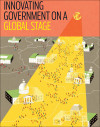SPONSORED SUPPLEMENT TO SSIR
Innovating Government on a Global Stage

This special supplement includes nine articles produced for the Open Government Partnership. OGP is a new effort to foster greater transparency and accountability, improve governance, and increase civic engagement worldwide.
-
Transforming Multilateralism: Innovation on a Global Stage
-
Shattering Decades of Diplomatic Protocol
-
Innovating Modern Democracy, in Brazil and Globally
-
Advocacy from the Inside: The Role of Civil Society
-
The UK’s Transparency Agenda
-
Tanzania’s Transparency Agenda
-
Philanthropy Can Catalyze an Open Government Movement
-
India in Open Government and Open Government in India
-
Building a Global Norm on Open Government
On April 17, 2012, Brazil hosted the first High-Level Conference of the Open Government Partnership (OGP)—a partnership that grew in a mere six months from eight founding countries to 55 participating governments. As I write, the number of participants has grown to 58 countries, and I am certain it will rise again by the time this article is published.
Brazil was one of the founding countries and the first co-chair of the initiative, side by side with the United States, because OGP’s rationale and its objectives converged with the government directive of transparency implemented at the very beginning of the first term of President Luiz Inácio Lula da Silva’s government in 2003. So in January 2011, when the White House approached the Office of the Comptroller General, which I head, about the Brazilian government’s interest in this new idea, we were immediately authorized by President Dilma Rousseff to join the endeavor.
Since then, and with support from the Ministry of Foreign Affairs and other Brazilian ministries, the participation and the commitments to be adopted under OGP have coincided with our government’s aims. OGP has augmented goals and projects already under way or in initial phases of development.
I imagine that Brazil’s experience is not so different from other OGP member countries, because the partnership was created to build on transparency and good governance reforms being carried out domestically—to greater or lesser degree—by governments around the world. The project has great appeal: it is a global challenge for government and civil society stakeholders to address, very directly, the concept of democracy—modern democracy. It has provoked positive reactions in many countries, even in nations where previously there had not been much engagement with the issue of open government.
On the other hand, there is little doubt that civil society pressure influenced some governments to join the project, and this is one of the benefits of civil society organizations’ participation in the initiative and on OGP’s steering committee. Another important aspect of OGP is the way it highlights innovative projects in developing and developed countries. For example, Brazil’s online Transparency Portal publishes expenses incurred by the government on a daily basis in easily understandable terms, enabling anyone to monitor budget execution and help prevent corruption. The portal also publishes the paychecks of all public officials, from President Rousseff to the humblest public employee. It shows that there is no monopoly on cutting-edge solutions for common governance issues. This type of innovation has encouraged a wide range of countries to join the partnership.
The leadership roles of Brazil, Mexico, Indonesia, and South Africa, which all are on OGP’s steering committee, sent an important signal to countries in the South that the playing field is changing.
An equally important aspect of OGP is that it is a voluntary government commitment. The fact that it is non-mandatory makes it markedly different from other international initiatives, such as the United Nations Convention against Corruption, which requires governments to adopt measures to increase transparency in the public sector and to engage society and the private sector to prevent and fight corruption. At the same time, OGP differs from other international mechanisms in that no distinction is made between developed or emerging countries and underdeveloped or economically modest nations.
Brazil’s early and active participation in the partnership has encouraged other countries—both emerging economies and more economically modest nations—to join OGP. The possibility of exchanging experiences and sharing learning seems more feasible in this environment. And the leadership roles of countries like Brazil, Mexico, Indonesia, and South Africa, all of which are on OGP’s steering committee, sent an important signal to countries in the South that the playing field is changing.
Having said this, I would equally stress that there is a wide distance among countries on the steering committee and in the partnership: they are not, by any means, a homogeneous group. Some of them, usually referred to as emerging economies, such as Brazil, South Africa, and Russia, are not necessarily emerging democracies. Either their democratic institutions are already beyond the stage of “emerging,” or they are not yet democratically robust, despite their nations’ economic strength. For OGP, promoting solid democratic institutions is what counts most.
Fortunately, with the support of UNDP and OECD, countries of the so-called Arab Spring (Middle Eastern and North African nations), such as Tunisia, seem to be willing to prepare their institutions for future adherence to OGP.
OGP has barely completed its first year. It might be premature to make any thorough evaluation of its results. It is, however, clear that OGP has been able to generate some concrete changes in attitudes in such sensible government areas as transparency and openness. And this accomplishment surely deserves special attention, even outright celebration.
Support SSIR’s coverage of cross-sector solutions to global challenges.
Help us further the reach of innovative ideas. Donate today.
Read more stories by Jorge Hage.

